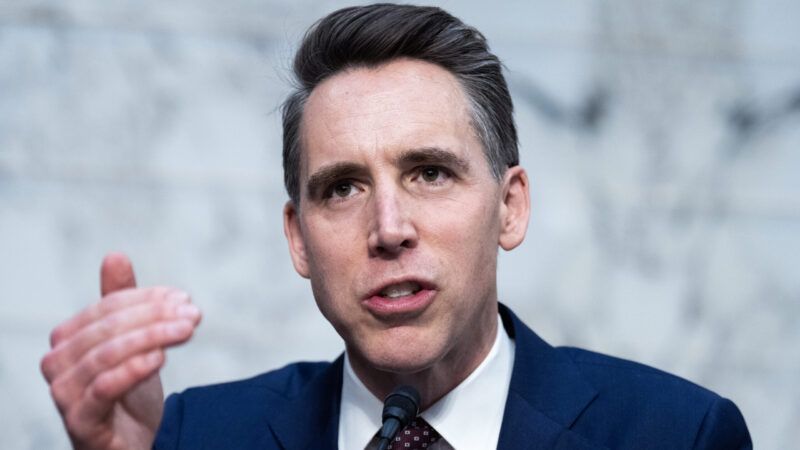Josh Hawley Wants To Raise the Minimum Wage
It’s not the only way the Republican senator is closer to democratic socialism than to traditional conservatism.

Sen. Josh Hawley (R–Mo.) has introduced a bill to increase the federal minimum wage, which has been $7.25 an hour since 2008. Hawley wants it to be $15 an hour. Many of us thought that the minimum wage issue was settled, but here we are again.
This is freshman-level economics: If you introduce a price floor on labor, the supply of people willing to work at that wage will exceed the demand, resulting in unemployment. If an employer can either have three employees making $10 an hour or two at $15 an hour (and one on public assistance), which do you think he would choose? Politicians like Hawley seem to think companies will simply accept lower profit margins. But they won't—they'll raise prices, cut staff, or go out of business.
Since hardly anyone earns $7.25 an hour these days, the federal minimum wage doesn't cause serious economic distortion. A $15 mandate, by contrast, would wreak havoc, especially in low-cost-of-living areas. A simple thought experiment would be to imagine what would happen if we had a $10,000-an-hour minimum wage. This would obviously eliminate most jobs. The same principle applies to smaller hikes, even if the effects would not be as drastic. If prosperity could be legislated, we would have done it long ago.
Hawley is an interesting mix: socially conservative, economically populist. He has supported tax hikes on the rich, expanding the power of unions, capping credit card interest rates, expanding Social Security, imposing tariffs, and imposing prescription drug price controls. He's frequently on the same side as such left-wing figures as Sens. Elizabeth Warren (D–Mass.) and Bernie Sanders (I–Vt.). In fact, he and Sanders, a self-described socialist, co-sponsored the bill to cap credit card interest rates.
What does it mean to be a Republican these days? What defines Republican economics? It used to be lower taxes or balanced budgets, but no longer. The Democrats are getting a lot of mileage out of being anti-tariffs, but that's not because they are philosophically committed to free trade—most of them are reflexively opposing Trump. If a Democrat is elected in 2028, there's a good chance they'll maintain his tariffs. Voters don't have many free market choices remaining.
We are a long way from 2005, when President George W. Bush and Treasury Secretary John Snow made an honest attempt at privatizing Social Security, or from 1998, when President Bill Clinton was pondering a bipartisan move along similar lines.
The camera loves Hawley; he's handsome, articulate, and dangerous. When it comes to economics, there isn't much daylight between him and the furthest-left factions of the Democratic Party. It is all about the packaging. If Hawley seems less crazy to the average voter than Warren and Bernie, that should worry us all.


Show Comments (83)